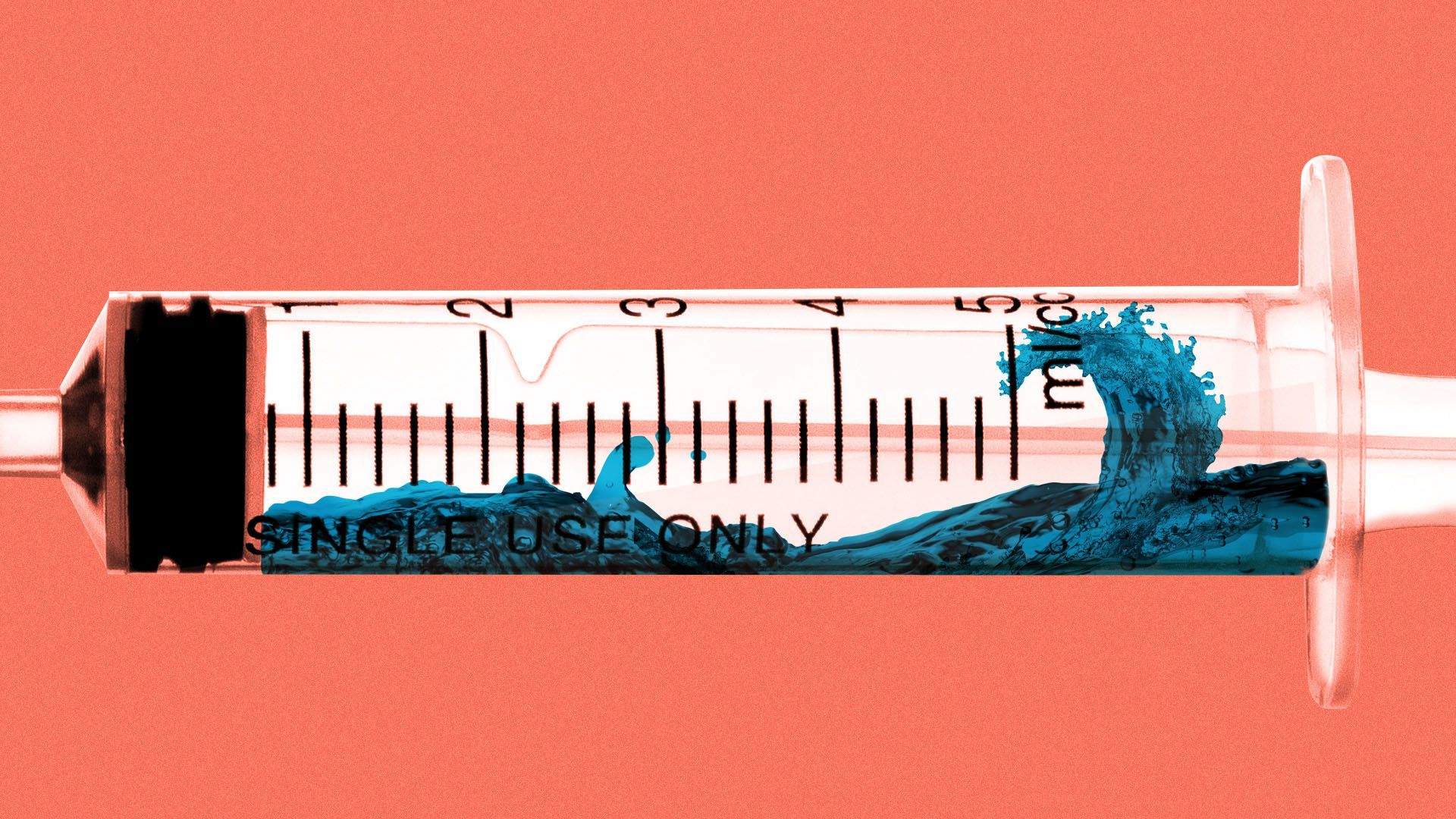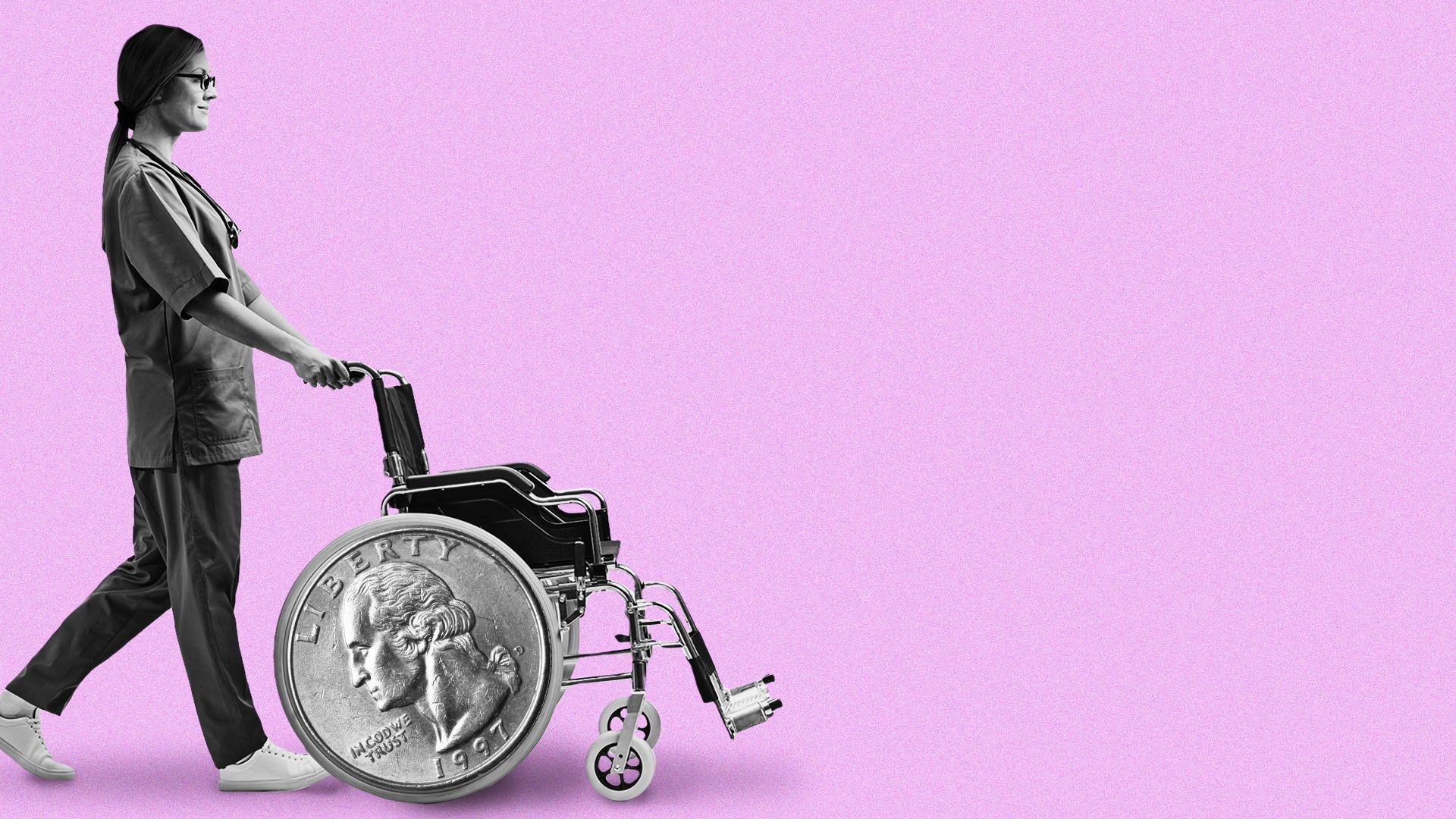| |
| |
| |
| Presented By Blue Cross Blue Shield Association |
| |
| Axios Vitals |
| By Caitlin Owens ·Jul 27, 2021 |
| Good morning. Situational awareness: House Speaker Nancy Pelosi (D-Calif.) is expected to extend proxy voting throughout the fall — and potentially until the end of the year, Axios reported last night. Today's word count is 1,054, or a 4-minute read. |
| |
| |
| 1 big thing: A tidal wave of vaccine mandates |
 |
|
| Illustration: Sarah Grillo/Axios |
| |
| State governments, private businesses and even part of the federal government are suddenly embracing mandatory coronavirus vaccinations for their employees. Why it matters: Vaccine mandates have been relatively uncommon in the U.S. But with vaccination rates stagnating and the Delta variant driving yet another wave of cases, there's been a new groundswell of support for such requirements. Driving the news: Monday was a turning point. - The VA became the first federal agency to require its employees to be vaccinated.
- More than 50 medical groups called for mandatory vaccinations of all health care workers, WaPo first reported.
- California announced that state employees and health care workers must show proof of vaccination or get tested regularly.
- New York City brought all municipal workers — including teachers and police officers — under a vaccine requirement that had previously only applied to health workers.
- Even the SF Bar Owner Alliance hopped onboard, announcing that the 500 San Francisco bars it represents will require indoor customers to show proof of vaccination or a negative test.
The big picture: Vaccine requirements are also gaining steam internationally. - France has required health workers to get vaccinated. Members of the public must also have a vaccine or a negative test to enter most indoor venues.
- Although the measure has sparked protests, it's also encouraged millions of people to get vaccinated, per the NYT.
Yes, but: Many Republican-led states have preemptively prohibited vaccine requirements, at least in some settings. The bottom line: Vaccine mandates have been unpopular in part because they'll inevitably create a backlash. - But the vaccination effort seems to have run out of carrots to incentivize more people to get a shot, and with rates remaining as low as they are in light of a worsening domestic situation, resorting to sticks has clearly become a more attractive option.
|
    |
| |
| |
| 2. Opioids settlement cash won't be hard to find |
 Data: Company filings; Chart: Sara Wise/Axios Since 2016, the four companies involved in the latest opioid settlement — Johnson & Johnson, McKesson, AmerisourceBergen and Cardinal Health — have funneled a combined $100 billion to shareholders through stock buybacks and dividends. Why it matters: If that's any indication, those companies won't have much trouble paying off a combined $26 billion settlement agreement, Axios' Bob Herman reports. By the numbers: J&J represents 80% of the stock buyback and dividend cash from the four companies over the past five years. - J&J has much higher profit margins than the other three, which are drug distributors, because J&J sells pharmaceuticals and medical devices alongside its consumer products.
- The company's dividends in 2020 alone totaled $10.5 billion — more than double the $5 billion it'll have to pay out over nine years, per the proposed settlement.
The distributors have lower profit margins, but Wall Street doesn't expect the settlement to absorb large chunks of their cash flows. What to watch: Whether the settlement sticks. The deal would effectively end these companies' opioid liabilities — but states still have 30 days to sign, and then local governments have four months to join. |
    |
| |
| |
| 3. New protections for long COVID patients |
| The White House said yesterday that people with long COVID symptoms may qualify for federal disability resources and must receive accommodations. - Additionally, people with the illness are entitled to discrimination protections under the Americans with Disabilities Act, per new guidance released by the administration.
Between the lines: Researchers are still trying to determine the prevalence of long COVID in the U.S., how long the disease lasts, and how it's likely to impact the country going forward. - But it's become increasingly clear that this particular side effect of the pandemic isn't going away any time soon, and could have long-term implications — a reality that is acknowledged by recognizing the disease as a disability.
The irony: At least one Republican-controlled state has created similar protections against "discrimination" based on vaccine status, also using civil rights language. - Other laws offering the same protection to unvaccinated people have been introduced all over the country.
- That means that in some places, people will have legal protection should they decide to forgo vaccination against the coronavirus and if they then get infected and go on to develop long-term, debilitating symptoms.
|
    |
| |
| |
| A message from Blue Cross Blue Shield Association |
| Closing the low-income coverage gap |
| |
 |
| |
| Millions more Americans could gain access to high-quality health insurance coverage by expanding Medicaid. Let's close the low-income coverage gap and create a more equitable health care system that works better for everyone. Learn how. |
| |
| |
| 4. Medicare shrinks racial disparities |
 |
|
| Illustration: Shoshana Gordon/Axios |
| |
| Medicare helps to reduce racial and ethnic disparities and close gaps in insurance coverage, a new study in JAMA Network shows. Why it matters: This raises the possibility that expanding the program could further reduce health disparities — a timely idea, as Senate Democrats debate lowering the Medicare eligibility age and broadening its benefits, Axios' Marisa Fernandez reports. What they found: Medicare access at age 65 sharply reduced the share of Black and Hispanic people reporting poor health and poor access to care, but not mortality, the study notes. - Respondents were "significantly more likely" to be insured immediately after age 65 compared to before turning 65, and coverage increased more for Black and Hispanic adults than white adults.
- Medicare eligibility alone doesn't completely eliminate disparities among the elderly, suggesting other social determinants of health need to be addressed.
State of play: Senate Democrats have signaled that they'll attempt to expand Medicare to include dental, hearing and vision coverage in the coming months. - Although lowering the Medicare eligibility age from 65 to 60 wasn't included in their original proposal, Axios has reported it's still possible that the measure gets included.
|
    |
| |
| |
| 5. A grim reminder |
| We still don't have ideal treatment options for coronavirus patients, the Wall Street Journal reports. Why it matters: The rise in coronavirus cases, particularly among the unvaccinated, would be a lot less concerning if an antiviral with a good track record of curing COVID patients existed. - But, a year and a half into the pandemic, it doesn't.
State of play: The U.S. has cleared or recommended 10 drugs for use against the coronavirus, two of which later had their authorizations rescinded. - Another doesn't work against new variants.
- The most effective early treatments are complicated to administer, and those given to hospitalized patients "can only do so much for patients who are already severely ill," per the WSJ.
The bottom line: Vaccines are our best medical intervention against the virus. But they're only effective before someone gets sick, not after. |
    |
| |
| |
| A message from Blue Cross Blue Shield Association |
| Continuing the fight for America's health |
| |
 |
| |
| Nationwide, Blue Cross and Blue Shield companies are supporting communities and helping Americans get vaccinated by: - Building confidence in vaccines.
- Partnering to meet local needs.
- Connecting with the most at-risk.
For the health of America. |
| |
| Editor's note: Item 1 in yesterday's newsletter should have said that the viral load of the Delta variant is 1,000 times that of the original strain, making it more transmissible (not that the virus is 1,000 times more transmissible). |
 | | It'll help you deliver employee communications more effectively. | | |
No comments:
Post a Comment